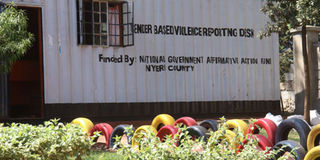Nairobi may join South Africa, Rwanda, Nigeria who have safe homes for GBV victims, survivors

Nairobi County will soon have safe homes for victims of sexual and gender-based violence (SGBV) if a Bill before the assembly becomes law.
The Bill sponsored by nominated Member of County Assembly (MCA) Wanjiru Kariuki, seeks to have the county establish at least one safe house per sub-county. If enacted, Nairobi will have at least 17 shelters for the victims and survivors.
Under the proposed law, the county will be required to facilitate the establishment of County Forensic Laboratory for analysing samples on SGBV.
“The safe house shall offer temporary stay for victims, provide services in the most effective and efficient way, and provide services that are holistic, inter-sectorial and delivered by appropriate multi-disciplinary team,” says the Bill.
The shelter will also be required to ensure access to an empowering environment and programs appropriate to victims’ individual development and therapeutic needs.
The Bill further says the county will be required to provide budgetary allocations for new and existing programs on SGBV.
Multi-sectorial approach
The governor in consultation with the County Public Service board, will also be required by the law, to appoint someone to handle the day to day running of the shelter.
The Bill currently in its second reading, makes it mandatory for victims and survivors of SGBV to be protected according to the law.
It requires every health institution whether public or private, and medical insurance providers to facilitate health services to SGBV victims without unnecessary impediments.
The county, the Bill says, will be expected to go through a multi-sectorial process to promote public awareness on the causes, impact, consequences, means of prevention and response to SGBV through a campaign.
“The education and information campaign shall employ pragmatic and innovative approaches, focus on the family as the basic social unit and confront the dangers and impact of SGBV,” says the Bill.
The campaign will take place in learning institutions, churches and communities within the county.
The new law will also establish SGBV County Management Committee appointed by the governor.
Among their duties will be coordination and oversight of SGBV activities, developing county action plan for prevention and response to SGBV, and collecting data.
Highest casualties
Gender and human rights activists see the proposed law as timely since Nairobi experiences high cases of SGBV especially in slums, with women and children being the highest casualties.
A report by the National Crime and Research Centre 2014, says Nairobi County had a rape relevance of 64.9 per cent being among the top five counties in the country. Other counties included Kilifi, Kisii, Mombasa and Machakos.
The report also puts the county’s defilement prevalence at 57.1 per cent with Mombasa, Kisii, Machakos and Nyeri also featuring prominently.
On sexual assault, the county was among those with highest prevalence alongside Samburu, Kisii, Mombasa and Nakuru.
Once enacted, the new law will pave way for Nairobi County to join other African countries with similar centres.
South Africa has Thuthuzela Care Centres, known as models of good practice in the fight against rape linked to HIV and AIDS. They are a unique one-stop centres where response is given to victims of violent sexual acts against women and children. They are a critical part of South Africa’s anti-rape strategy, aiming to reduce secondary trauma for the victims.
Thuthuzela’s integrated approach to rape care is described as that one of respect, comfort, restoring dignity, and ensuring justice for the victims.
Compassionate care
Rwanda too, has similar centres thatdeliver high-quality, compassionate health care to GBV survivors.The centres have physicians, nurses, social workers, psychologists and police who help SGBV victims and survivors.
They ensure counselling and safety planning, special care for children and adolescents, referrals, and survivor follow-up.
Other African countries that have initiated the concept of safe homes include Nigeria, Madagascar, Liberia, Guinea, Ghana and Haiti.
According to the World Health Organisation, one in three women in the world has experienced GBV in her lifetime. WHO says even when high-quality services are available, stigma, victim-blaming, and a lack of awareness of help, can block women from getting the care they need.





